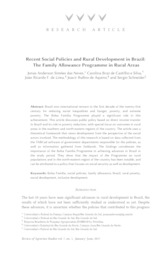Recent social policies and rural development in Brazil: the Family allowance programme in rural areas.
Recent social policies and rural development in Brazil: the Family allowance programme in rural areas.
Author(s): NEVES, J. A. S. das; SILVA, C. B. de C e; LIMA, J. R. F. de; AQUINO, J. R. de; SCHNEIDER, S.
Summary: Brazil won international renown in the first decade of the twenty-first century for reducing social inequalities and hunger, poverty, and extreme poverty. The Bolsa Família Programme played a significant role in this achievement. This article discusses public policy based on direct income transfer in Brazil and its role in poverty reduction, with special focus on outcomes in rural areas in the southern and north-eastern regions of the country. The article uses a theoretical framework that views development from the perspective of the social actors involved. The methodology of this research is based on data collected from the TABCad software of government departments responsible for the policies, as well as information gathered from fieldwork. The findings corroborate the importance of the Bolsa Família Programme in achieving advances in Brazil in the study period. They show that the impact of the Programme on rural populations and in the north-eastern region of the country has been notable, and can be attributed to a policy that focuses on social security as well as development.
Publication year: 2017
Types of publication: Journal article
Unit: Embrapa Semi-arid Region
Observation
Some of Embrapa's publications are published as ePub files. To read them, use or download one of the following free software options to your computer or mobile device. Android: Google Play Books; IOS: iBooks; Windows and Linux: Calibre.
Access other publications
Access the Agricultural Research Database (BDPA) to consult Embrapa's full library collection and records.
Visit Embrapa Bookstore to purchase books and other publications sold by Embrapa.

